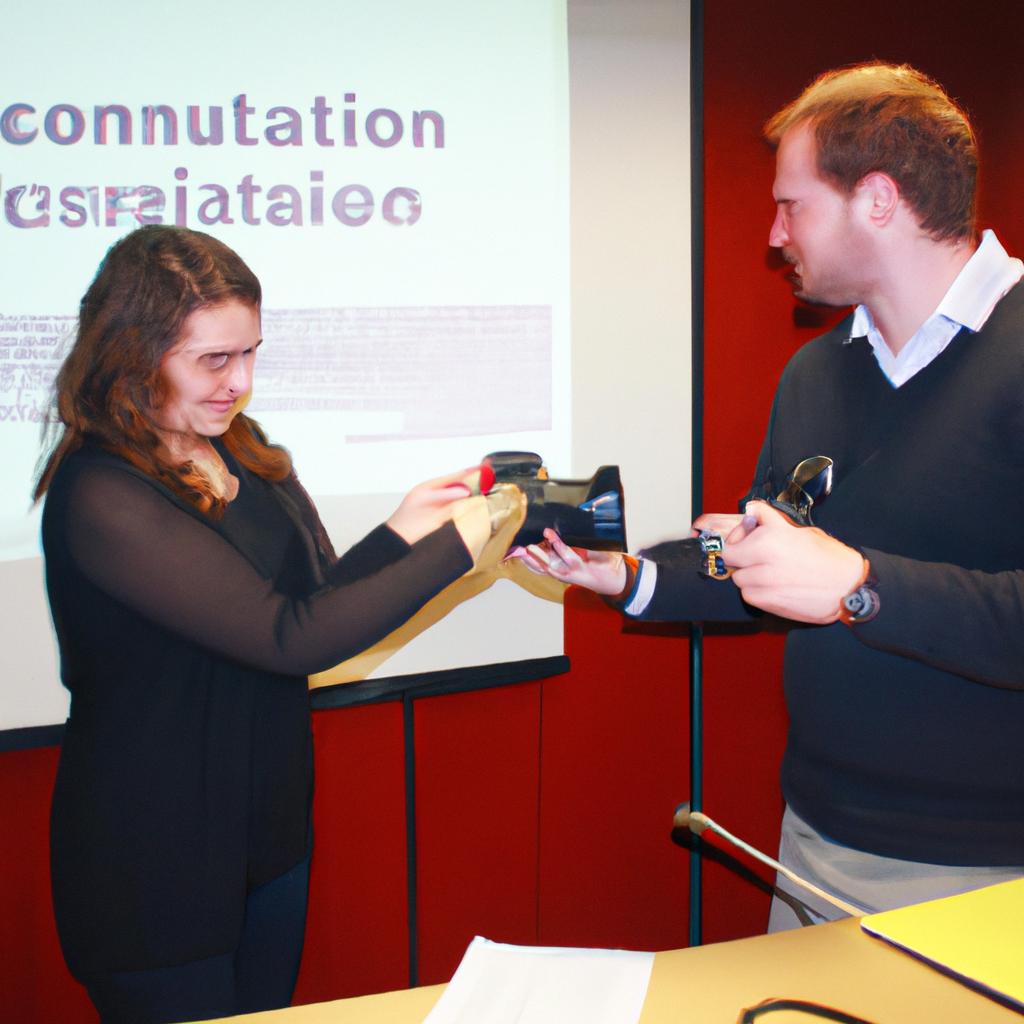College Grants: Broadcasting Financial Aid for Radio
In today’s digital age, radio broadcasting continues to thrive as a powerful medium of communication and entertainment. With its ability to reach diverse audiences across different regions, radio remains an essential platform for music, news, talk shows, and more. However, pursuing a career in radio broadcasting requires not only talent and dedication but also financial resources. This article explores the availability of college grants specifically tailored to support aspiring radio broadcasters in their educational pursuits.
Imagine a passionate high school student named Sarah who dreams of becoming a renowned radio broadcaster one day. Despite her exceptional skills and unwavering determination, Sarah finds herself confronted with the harsh reality that financing her education will be an obstacle on her path to achieving this dream. Fortunately, there are numerous opportunities available in the form of college grants that can provide financial aid to students like Sarah who aspire to pursue higher education in the field of radio broadcasting. By delving into these grant options and understanding their eligibility criteria and application processes, individuals like Sarah can gain valuable insights into how they can fund their education while pursuing their passion for radio broadcasting.
Understanding College Grants
Imagine a talented high school student named Sarah who dreams of pursuing a career in broadcasting. She envisions herself hosting her own radio show, captivating listeners with her vibrant personality and insightful commentary. However, like many aspiring college students, Sarah faces the daunting challenge of financing her education. Fortunately, she discovers the realm of college grants – an invaluable resource that can help turn her dreams into reality.
Role of College Grants:
College grants play a crucial role in providing financial assistance to students seeking higher education. These grants are typically awarded based on various criteria such as academic merit, financial need, specific field of study, or demographic considerations. Unlike loans, which require repayment with interest, grants are essentially free money provided by government agencies, educational institutions, private organizations, or philanthropic foundations.
Emotional Impact:
To truly grasp the significance of college grants for individuals like Sarah, consider the following aspects:
- Access to Education: College grants open doors to education for those who may not have the means to afford it otherwise. They ensure that deserving students from diverse backgrounds have equal opportunities to pursue their passions and contribute meaningfully to society.
- Alleviation of Financial Burden: The cost associated with attending college can be overwhelming for many families. By offering financial aid through grants, these burdensome expenses become more manageable and allow students to focus on their studies without constantly worrying about finances.
- Empowerment Through Meritocracy: College grants promote a sense of fairness and reward hard work and dedication. They empower talented individuals like Sarah by recognizing their achievements and potential rather than solely considering their ability to pay for tuition fees.
- Social Mobility: Grant programs also foster social mobility by enabling students from disadvantaged backgrounds to access quality education. Breaking the cycle of poverty becomes more attainable when individuals receive support in pursuing higher education.
Table showcasing different types of college grants (markdown format):
| Type | Criteria | Provider | Benefits |
|---|---|---|---|
| Need-based | Financial need | Government/Institutions | Covers tuition, books, and living expenses for eligible students |
| Merit-based | Academic merit | Educational institutions | Recognizes outstanding achievements with financial support |
| Field-specific | Specific majors | Private organizations | Supports students pursuing careers in specific fields |
| Diversity | Demographic | Philanthropic foundations | Promotes diversity by supporting underrepresented groups |
Understanding the vital role of college grants lays a strong foundation for exploring additional options that can further assist individuals like Sarah in their quest for higher education. By delving into various avenues of financial aid, such as scholarships and work-study programs, prospective students can maximize their chances of obtaining the necessary resources to fulfill their academic aspirations.
Exploring Financial Aid Options
In the previous section, we explored the various types of college grants available to students. Now, let’s delve into a specific area where financial aid can greatly assist aspiring individuals – broadcasting programs. To better understand how college grants support those pursuing a career in radio, let’s examine an example.
Consider Sarah, a talented student with a passion for radio broadcasting. Despite her enthusiasm and dedication, she faces financial obstacles that could hinder her education and ultimately limit her opportunities within the industry. However, thanks to college grants specifically designed for broadcasting students like herself, Sarah can pursue her dreams without undue financial burden.
To shed light on the importance of these grants in supporting aspiring broadcasters, here are some key points:
1) Accessible Education: Broadcasting grants provide deserving students from diverse backgrounds with access to high-quality educational programs that would otherwise be financially out of reach.
2) Skill Development: Through comprehensive coursework and hands-on training made possible by these grants, students obtain valuable skills necessary to thrive in the competitive world of radio broadcasting.
3) Networking Opportunities: Many broadcasting grant programs offer internships or networking events that allow students to connect with professionals in the industry, opening doors to potential future employment.
4) Industry Support: By investing in broadcasting education through grants, organizations demonstrate their commitment to fostering talent and ensuring a vibrant future for the field.
Let’s now take a closer look at how college grants contribute towards empowering aspiring broadcasters:
| Benefits of College Grants for Broadcasting Students | |
|---|---|
| Accessible Education | |
| Skill Development | |
| Networking Opportunities | |
| Industry Support |
As we have seen, college grants play an essential role in supporting budding radio personalities like Sarah as they navigate their academic journey. Not only do these grants alleviate financial burdens but they also provide opportunities for growth, networking, and industry support. Next, we will explore the significance of broadcasting scholarships in furthering these aspirations.
The Importance of Broadcasting Scholarships
Exploring Financial Aid Options has provided an overview of the various sources of financial assistance available to students pursuing a career in broadcasting. Now, let us delve deeper into the specific realm of college grants that are tailored towards individuals interested in radio broadcasting. To shed light on the significance of these grants, consider the case study of Sarah, a passionate student seeking funding opportunities to help her achieve her dreams.
Sarah’s love for radio started at a young age when she would spend hours tuning into different stations and imagining herself as the voice behind the microphone. However, like many aspiring broadcasters, she faced financial constraints that threatened to hinder her educational pursuits. Fortunately, through diligent research and guidance from her academic advisors, Sarah discovered several college grants specifically designed for students interested in radio broadcasting.
To better understand the scope and impact of these grants on prospective students like Sarah, let’s explore some key aspects regarding their availability and benefits:
-
Accessibility:
- Unlike loans or scholarships with stringent eligibility criteria, college grants provide an accessible form of financial aid.
- Many organizations offer grants exclusively reserved for students pursuing degrees or certifications in broadcasting-related fields.
- These grants ensure that talented individuals with limited financial resources can pursue their passion without undue burden.
-
Affordability:
- College grants often cover a significant portion of tuition fees, making education more affordable for deserving applicants.
- This reduces the need for additional loans or part-time jobs that may distract students from focusing on their studies and honing their skills.
-
Networking Opportunities:
- Some grant programs also provide networking opportunities by connecting recipients with industry professionals.
- Through mentorship and internships facilitated by these programs, students gain valuable exposure and hands-on experience in the field.
-
Career Advancement:
- By receiving financial support through college grants tailored for radio broadcasting, students like Sarah have increased chances of achieving career success.
- The grants act as a stepping stone by helping students complete their education and gain the necessary skills to excel in the industry.
Table: Grant Programs for Radio Broadcasting
| Grant Program | Eligibility Criteria | Funding Amount | Application Deadline |
|---|---|---|---|
| Broadcast Dreams | Undergraduate radio broadcasting | Up to $5,000 per year | March 1st |
| Foundation for Sound | Graduate-level audio production | Varies based on need | Rolling basis |
| Voices of Tomorrow | High school seniors pursuing radio | $2,500 one-time award | May 15th |
| Radio Excellence | Community college radio broadcasting | $1,000-$3,000 per semester | October 31st |
In conclusion, college grants tailored for radio broadcasting offer a lifeline to aspiring individuals like Sarah who are passionate about pursuing a career in this field. These grants not only provide financial assistance but also open doors to networking opportunities and pave the way for future success. With various programs available catering specifically to those interested in radio broadcasting, students can find support to pursue their dreams and contribute meaningfully to the world of media.
As we move forward into our next section on “Tips for Applying to Radio Grants,” let us explore practical steps that students can take to maximize their chances of securing these valuable funding opportunities.
Tips for Applying to Radio Grants
Understanding the significance of broadcasting scholarships, let’s now explore some valuable tips on applying to radio grants.
When it comes to securing financial aid for pursuing a career in broadcasting, there are several key strategies that can increase your chances of success. By following these tips, you can navigate the application process with confidence and maximize your potential funding opportunities:
-
Research extensively: Begin by thoroughly researching available radio grants and their specific eligibility requirements. Familiarize yourself with the organizations offering these grants and understand their mission statements as well as any specific criteria they may have.
-
Tailor your applications: Each grant opportunity is unique, so take the time to tailor your applications accordingly. Highlight relevant experiences, skills, and achievements that align with the particular objectives of each grant program.
-
Craft compelling personal statements: Personal statements play a crucial role in demonstrating your passion for broadcasting and why you deserve financial assistance. Use this opportunity to showcase your dedication, goals, and how receiving a grant would contribute to your success in the field.
-
Seek letters of recommendation: Strong letters of recommendation can greatly enhance your application’s credibility. Reach out to professors or professionals who know you well and can speak about your abilities, work ethic, and commitment to pursuing a career in radio broadcasting.
- Overcoming financial barriers through grants brings hope and equal opportunities.
- Grant recipients often experience reduced financial stress during their college years.
- Accessing funds through radio grants allows students to focus more on honing their skills rather than worrying about tuition fees.
- Obtaining financial aid contributes positively towards academic achievement and overall success in the field.
Emotional Table:
| Benefits of Radio Grants |
|---|
| Empowers aspiring broadcasters financially |
| Provides access to quality education |
| Supports talent development |
| Encourages diversity in the broadcasting industry |
By following these tips and utilizing available resources, you can increase your chances of securing valuable financial aid for your studies in radio broadcasting. In our next section, we will discuss common eligibility requirements to help you determine if you meet the criteria for these grants.
Moving forward, let’s explore the common eligibility requirements that applicants should be aware of when applying for radio grants.
Common Eligibility Requirements
Having gained insights into the tips for applying to radio grants, it is essential to understand the common eligibility requirements associated with college grants specifically tailored for broadcasting financial aid in the field of radio. By familiarizing ourselves with these criteria, we can better navigate through the application process and increase our chances of securing funding.
Eligibility Requirements:
To be considered eligible for college grants targeting broadcasting financial aid in radio, applicants typically need to meet certain requirements. Here is an example case study illustrating some of these qualifications:
Case Study:
Sarah is a passionate student pursuing a degree in radio broadcasting at XYZ University. She wishes to apply for a grant that supports students interested in hosting their own radio shows on campus. Sarah must fulfill the following prerequisites:
- Enrolled as a full-time undergraduate student majoring in radio broadcasting.
- Maintain a minimum GPA of 3.0 throughout her academic career.
- Demonstrate exceptional communication skills and show strong interest in hosting radio programs.
- Provide two recommendation letters from faculty members who can attest to her commitment and potential in the field.
Table: Benefits of Broadcasting Financial Aid Grants
| Benefit | Description |
|---|---|
| Accessible Funding Opportunities | Provides financial resources specifically catered towards aspiring broadcasters, aiding them in covering various educational expenses such as tuition fees, equipment costs, or internships. |
| Career Advancement | Offers opportunities for professional growth by supporting practical experiences like attending industry conferences or participating in workshops relevant to the field of broadcasting. |
| Networking & Mentorship | Facilitates connections within the industry through networking events and mentorship programs, allowing recipients to learn from experienced professionals and potentially open doors to future employment prospects. |
| Recognition & Prestige | Enhances the recipient’s professional profile and credibility, as being awarded a grant signifies recognition of their talent and dedication to the field. |
By meeting the common eligibility requirements for college grants focused on broadcasting financial aid in radio, aspiring students like Sarah can access valuable funding opportunities that support their educational journey. It is crucial to thoroughly review these criteria before applying, ensuring a better chance at securing financial assistance.
Now, let us explore strategies for maximizing your grant opportunities and increasing your chances of receiving financial aid tailored specifically towards broadcasting in radio.
Maximizing Your Grant Opportunities
Transitioning from the previous section discussing common eligibility requirements for college grants, we now delve into strategies to maximize your grant opportunities specifically in the field of broadcasting. To illustrate these strategies, let’s consider a hypothetical student named Alex who aspires to pursue a career in radio broadcasting.
Alex is passionate about radio and has already completed their high school education with excellent grades. However, they are concerned about the financial aspect of attending college and obtaining a degree in broadcasting. This is where college grants can play a crucial role in making their dream a reality.
To increase the likelihood of receiving grants for studying radio broadcasting, there are several key steps that Alex should take:
- Research Grants: Begin by thoroughly researching different types of grants available specifically for students pursuing degrees or careers in broadcasting. Look beyond general scholarships and explore options designed explicitly for individuals interested in radio-related fields.
- Meet Eligibility Criteria: Ensure that you meet all the eligibility criteria specified by each grant program before applying. Pay attention to any specific GPA requirements, extracurricular involvement expectations, or other prerequisites outlined by potential funding sources.
- Polish Your Application: Craft an exceptional application that highlights your passion for radio broadcasting and showcases your relevant skills and experiences. Consider including examples of projects you have worked on or internships you have participated in within the industry.
- Seek Professional Guidance: Reach out to academic advisors, mentors, or professionals working in the field of radio broadcasting for guidance on finding suitable grant opportunities and improving your chances of success.
In addition to implementing these strategies, it can be helpful to understand how grants may be distributed among applicants based on various factors such as financial need or merit-based evaluation. The following table provides an overview:
| Grant Distribution Factors | Description |
|---|---|
| Financial Need-Based | Grants awarded primarily based on demonstrated financial need through documentation such as FAFSA (Free Application for Federal Student Aid). |
| Merit-Based | Grants awarded based on academic achievements, extracurricular involvement, or specific talents in the field of broadcasting. |
| Diversity and Inclusion | Some grant programs prioritize diversity and inclusion by considering applicants from underrepresented backgrounds. |
| Industry-Specific Criteria | Certain grants may have additional criteria tailored specifically to the radio broadcasting industry, such as previous experience in radio production or participation in related organizations. |
By understanding how grants are distributed and implementing effective strategies, Alex can increase their chances of securing financial aid for studying radio broadcasting.
In summary, when pursuing college grants for a career in radio broadcasting, it is crucial to conduct thorough research, meet eligibility requirements, submit polished applications, and seek guidance from professionals. Understanding various factors affecting grant distribution can also provide valuable insights into maximizing opportunities. By following these steps, students like Alex can strive towards fulfilling their aspirations without being hindered by financial constraints.
 K7BUC
K7BUC



